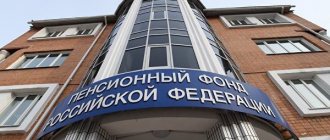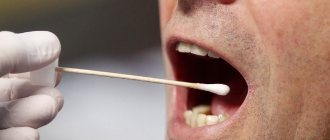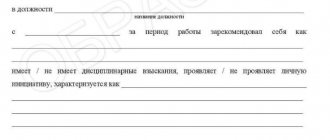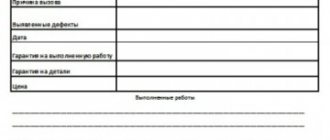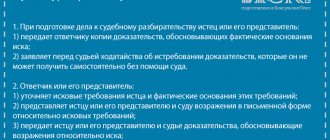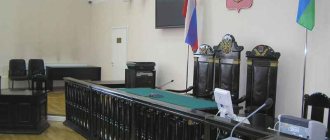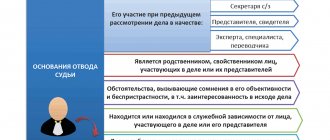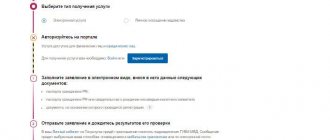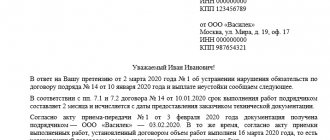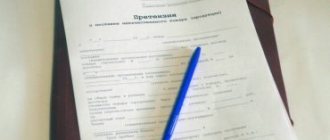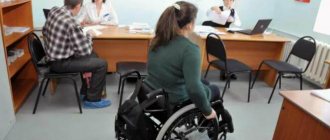Explanatory note to the Petition to appoint an examination
1 Definition of document
: A request to conduct an examination can only be filed in a court of first or appellate instance before the presiding judge declares the examination of evidence completed. Article 1 of the APC Administration of justice by arbitration courts. Justice in the field of entrepreneurial and other economic activities is carried out by arbitration courts in the Russian Federation, established in accordance with the Constitution of the Russian Federation and the federal constitutional law (hereinafter referred to as arbitration courts), by resolving economic disputes and considering other cases within their competence by the Arbitration Procedural Code of the Russian Federation Federation and other federal laws, according to the rules established by the legislation on legal proceedings in arbitration courts.
Request for an examination
. Art. 82 of the Arbitration Procedure Code, in order to clarify issues that arise during the consideration of a case that require special knowledge, the arbitration court appoints an examination at the request of a person or with the consent of the persons participating in the case. The range and content of the issues on which the examination must be carried out are determined by the arbitration court. In this case, the court proceeds from the fact that issues of law and legal consequences of evaluating evidence fall within the exclusive competence of the court. Persons participating in the case have the right to submit to the arbitration court questions that must be clarified during the examination. The court must provide reasons for rejecting the questions presented.
Advice
. The parties involved in the case should think through all the procedural subtleties in advance:
- prepare questions that should be asked before the examination, since in the future the expert’s conclusion is examined along with other evidence in the case. Questions formulated hastily can do more harm than good.
- think about who can be entrusted with the examination, since persons participating in the case have the right to apply for the involvement of persons specified by them as experts or for the examination to be carried out in a specific expert institution. The determination to order an examination must indicate the surname, name, patronymic of the expert or the name of the expert institution in which it is to be carried out.
In what cases is arbitration expertise necessary?
In legal disputes between the Customer and the Contractor regarding the volume, quality, timing of work, cost or causes of destruction, an expert examination of the arbitration examination can play a decisive role.
This independent research helps to objectively assess the situation and answer specific questions from the court. For example:
1. Is this or that work done with high quality?
2. What is the cost of restoration repairs?
3. Is the house permanent? And many others.
The types of expertise in the arbitration court, often in demand when resolving economic, property and inheritance disputes, can be very different.
A-EXPERT specializes in the following types of examinations in the arbitration court:
- construction, technical, engineering arbitration examination
- expert handwriting assessment
- economic or accounting and patent forensic examination in arbitration proceedings
- land management
- merchandising for certain groups of goods (products)
- appraisal (cost) examination
- also a number of other examinations (how long ago the building was erected, divisions of real estate, etc.).
Competent technical expertise in the arbitration process is an important condition for winning construction, appraisal and trade disputes.
Important. The appointment of a forensic examination in arbitration proceedings occurs at the request of the participants. Reasoned proof of your rights in arbitration is a guarantee of a positive decision in your favor.
The following tasks can be resolved upon request:
Having carried out a commodity examination (research of industrial and food products), it is possible to provide evidence of the suitability or unsuitability of industrial, as well as food products;
Having carried out a computer-technical examination (research of information computer tools), it is possible to prove in the Arbitration Court the suitability for the use of computer tools, information technology, the authenticity of the video recording, ...;
Also, after conducting an examination, you can provide evidence to the court of the authenticity of markings (on products made of metals, polymers and other materials);
After conducting an examination at the request, you can also provide evidence of video and sound recordings to the court (examination of the sound environment and video images, conditions, means, materials and traces of sound recordings and video recordings). If there is an examination, it is easier for the court to make a decision. There must be a bona fide expert.
But it is also clear to everyone that sometimes the staff specialists of state forensic institutions are not always able to resolve specific issues of increased complexity related to intellectual property. State forensic institutions, due to the lack of patent specialists on staff and overload with other types of examinations, do not always undertake examinations related to intellectual property. Most often, it is advised to contact non-governmental expert organizations that interact with relevant specialists on a contractual basis.
Application deadlines. A request to conduct an examination can only be submitted in a court of first instance or appellate instance before the presiding judge at the court hearing declares the examination of the evidence completed.
Types of examinations performed.
Art. 83 of the APC examination is carried out by state forensic experts of a forensic institution and other experts from among persons with special knowledge. Types of examinations: carried out in forensic institutions of the Ministry of Justice of the Russian Federation, approved by Order No. 114 of May 14, 2003 (as amended on September 12, 2005, March 9, 2006 and March 12, 2007). It contains 26 positions, among which, unfortunately, there is no provision for examination related to intellectual property.
The conclusion of an expert of a non-state expert organization cannot be challenged only due to the fact that the conduct of the relevant examination could be entrusted to a state forensic expert institution. The main thing is that the expert has special knowledge, and his conclusion complies with the requirements of the federal law “On State Forensic Activities in the Russian Federation” and is based on provisions that make it possible to verify the validity of the conclusions made on the basis of generally accepted scientific and practical data, and within the relevant specialty expert. Each expert participating in a comprehensive examination is responsible only for those studies that he personally conducted and for those conclusions in the formulation of which he participated.[1]
In Russia there is no Patent Court that would consider cases related to intellectual property, and there is no case law, but judicial practice should be uniform. It is unacceptable for the same norm to receive different interpretations in the same legal situations. Therefore, judicial practice is generalized, and the Plenum of the Supreme Arbitration Court of the Russian Federation issues guiding clarifications in the form of resolutions, which are the official normative interpretation and are binding on all arbitration courts.
Re-examination. In accordance with Art. 86 of the APC, the expert’s conclusion is announced at the court hearing. The court has the right to provide the expert with the time necessary to prepare answers to questions. The results of the examination have important evidentiary value.
The request of one of the parties to conduct a second forensic examination will be satisfied if the conclusion is unclear and complete (as a rule, even from the list of literature and terminology used, one can understand how knowledgeable the expert is in a particular area of knowledge).
Conditions for conducting the examination. In accordance with Art. 108 of the Arbitration Procedure Code, sums of money to be paid to experts are deposited into the deposit account of the arbitration court by the person who filed the corresponding petition within the period established by the arbitration court. If the said petition is submitted by both parties, the required sums of money are deposited by the parties into the deposit account of the arbitration court in equal parts. Receipt of funds into the deposit account is a prerequisite for conducting the examination. If the parties fail to fulfill their obligation to deposit monetary amounts in the established amount into the deposit account, the court has the right to make a ruling to reject the petition to appoint an expert examination.[2]
Applicable Law.
APK articles
.
- Appointment of examination (Article 82 of the Arbitration Procedure Code of the Russian Federation)
- Arbitration process Expert (Article 55 of the Arbitration Procedure Code of the Russian Federation)
- Appointment of examination Article 66.
Civil Code
Russian Federation. Chapter 72 - Patent Law. Article 1386 Substantive examination of an application for an invention.
- Article 1383 of the Civil Code of the Russian Federation Consequences of coincidence of the priority dates of an invention, utility model or industrial design.
Plenum of the Supreme Arbitration Court of the Russian Federation.
- RESOLUTION of December 20, 2006 N 66 ON SOME ISSUES IN THE PRACTICE OF APPLICATION OF LEGISLATION ON EXAMINATION BY ARBITRATION COURTS [3].
In accordance with Part 1 of Art. 82 of the Arbitration Procedure Code of the Russian Federation, if it is necessary to conduct an additional or repeated examination, the arbitration court may order an examination on its own initiative without a corresponding petition from a person participating in the case. If the expert’s conclusion is insufficiently clear or complete, as well as in case of doubts about its validity or inconsistency of the expert’s conclusions.
An example for drawing up a Petition for the appointment of an examination
Natalya and Denis filed a claim with the arbitration court against Nika LLC to recover the actual value of the share. By decision of October 12, 2008 in case No. A60-33601/2008, the claims were denied. By the decision of the appellate court dated January 21, 2009, the decision was left unchanged [4].
The cassation court, by resolution of February 5, 2009 N F09-3641/03-GK, canceled these judicial acts, indicating the following.
According to the case materials, the plaintiffs, who were members of Nika LLC from 1998 to 1993, believe that when they left the company’s membership, the size of their shares was determined incorrectly.
In refusing to satisfy the claims, the court of first instance proceeded from the size of the plaintiffs’ shares in the authorized capital of the company, indicated in expert opinions No. 4974/17 and No. 7551/34/17, accepted as evidence.
Leaving the decision unchanged, the appellate court pointed out that since the plaintiffs did not present evidence confirming a different size of their shares than indicated in the expert report, and did not file requests for a repeat or additional examination, then the refusal of the claim is legitimate.
FAS UrO found these conclusions of the court of first and appellate instances to be unfounded for the following reasons.
During the preparation of the conclusion, the expert did not examine the documents (4 receipts for cash receipt orders and a copy of the pay slip) confirming the additional deposit of funds for the purchase of shares. The court of first and appellate instances also did not give a proper legal assessment of these documents.
According to Art. 86 of the Arbitration Procedure Code of the Russian Federation, the expert’s opinion is one of the means of proof and is assessed by the court along with other evidence presented by the parties in the case materials.
Since it is not clear from the findings of accounting examinations No. 4974/23/17 and No. 755/34/17 presented in the case materials that the documents confirming Natalia’s additional contribution of funds to pay for the share were the subject of expert research and they were assessed, this expert opinion cannot be considered complete and justified.
In such circumstances, the court should have decided on the issue of ordering a repeat or additional examination. The court’s reference to the fact that the plaintiffs did not submit a request to order a repeat or additional examination is not sufficiently substantiated, since in accordance with Part 1 of Art. 82 of the Arbitration Procedure Code of the Russian Federation, if an additional or repeated examination is necessary, the arbitration court may order an examination on its own initiative (case No. A60-33601/2008)
Re-examination. In accordance with Art. 86 of the APC, the expert’s conclusion is announced at the court hearing. The court has the right to provide the expert with the time necessary to prepare answers to questions. The results of the examination have important evidentiary value.
The request of one of the parties to conduct a second forensic examination will be satisfied if the conclusion is unclear and complete (as a rule, even from the list of literature and terminology used, one can understand how knowledgeable the expert is in a particular area of knowledge).
Who pays for the expertise in the arbitration process?
Forensic examination in the arbitration court is paid from the general fund contributed by the parties to the process, or by the party interested in the examination. Even taking into account the fact that payment for a forensic examination in an arbitration process is carried out in advance, the costs are then compensated by the one who loses the process.
Parties often underestimate the crucial importance of expertise in arbitration for fear of legal costs. But a high-quality independent expert examination in the arbitration court will not only help you win the process, but will also guarantee that the losing party will reimburse all expenses. In extreme cases, the payment for the examination, as evidence, in the arbitration court is distributed between the parties to the dispute as a percentage.

